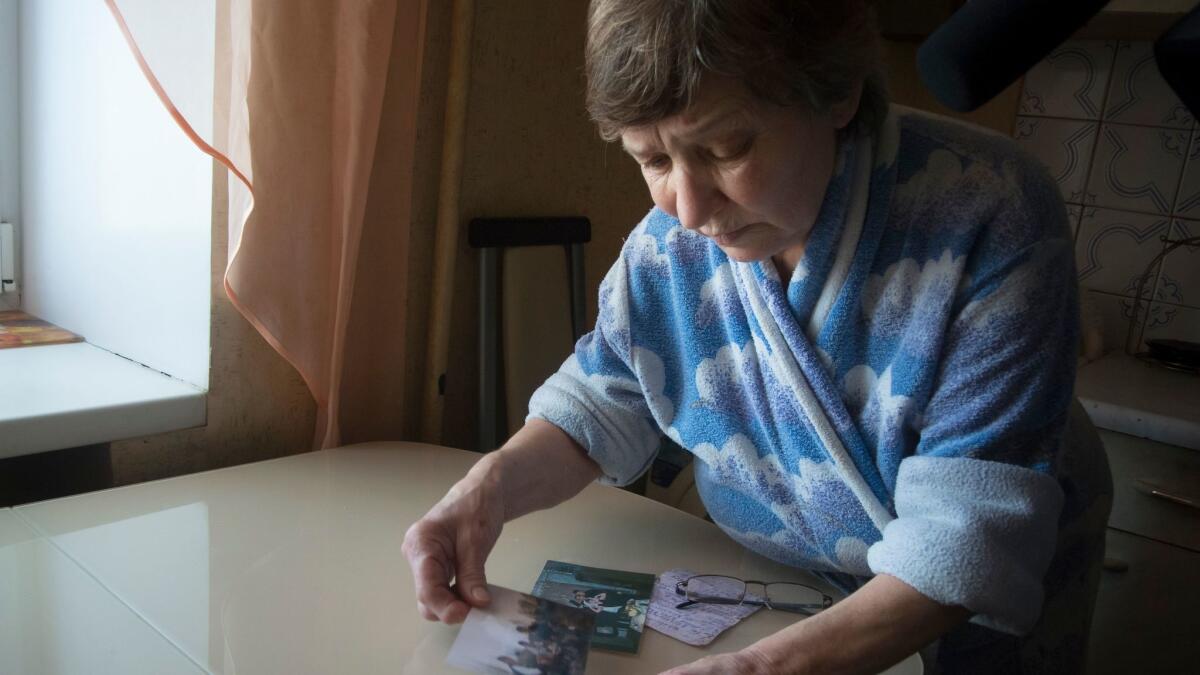Kremlin confirms Russians were among those killed in U.S. air strike in Syria, but says they were not Russian military

- Share via
Reporting from Moscow — After days of evading questions about Russian mercenaries killed in a U.S. air strike in eastern Syria, the Ministry of Foreign Affairs admitted Thursday that five of the dead were Russian citizens, but insisted they were not members of the military.
Maria Zakharova, the ministry’s spokeswoman, also denounced reports that dozens, and perhaps hundreds, of Russians were killed in the air strike, calling such reports “classical misinformation” from the Western press.
“There were not 400, not 200, not 1,000, and not 10,” she said.
During her weekly news conference in Moscow, Zakharova said: “According to preliminary information, we could be talking about the deaths of five people — presumably Russian citizens — as a result of an armed confrontation whose causes are being examined.”
She added: “I want to emphasize once again that we are not talking about Russian servicemen.”
It was the first time the Russian government had acknowledged the deaths since news broke over the weekend that Russians were killed during a Feb. 7 air strike, which the U.S. said it had launched to retaliate against an attack by hundreds of forces supporting Syrian President Bashir Assad near the Syrian city of Deir al Zor.
The Russian Ministry of Defense declined to comment. President Vladimir Putin has not addressed the issue. His spokesman, Dmitry Peskov, said only that the Kremlin is aware that there were Russian citizens killed in Syria.
The fighters killed in the air strike are believed to be part of a network of shadowy, private companies that provide mercenaries. News reports in Russia have linked the most-well-known of the companies, Wagner, to the Kremlin. The groups are believed to be supporting Syrian government forces.
The number of killed is still unknown. But Russian news outlets and open-source researchers and friends and families of those killed have gradually been confirming names of the dead. Dozens of the mercenaries wounded in the air strike are being treated in Moscow and St. Petersburg hospitals, according to Russian media reports.
The Associated Press reported Thursday that one of the dead was Ruslan Gavrilov, 37, one of seven men from the Russian village of Kedrovoye who joined Wagner.
His mother, Farkhanur Gavrilova, said one of her son’s colleagues had called her to say he had died. “He was torn to pieces,” she told the AP. “If he was alive — he is a plucky guy — he would have tried to call.”
The Feb. 7 air strike has brought the issue of Russian private military contractors to the surface at a time when there are fears that Syria’s multisided war could spiral into a broader conflict between the various foreign powers that have deployed forces to the country.
Within the same week of the air strike, rebels previously affiliated with Al Qaeda shot down a Russian Sukhoi-25, a Kurdish militia downed a Turkish helicopter, Israel shot down an Iranian drone and the Syrian military downed an Israeli F-16.
“I don’t even know another conflict in which the situation is more complicated than it is [in Syria] now,” said Alexander Khramchikhin, an analyst and deputy director of the Institute of Political and Military Analysis in Moscow. “It’s hard to count even the warring parties.”
Critics of the Kremlin allege that the private companies are acting at the behest of the Russian government. The government has insisted, as Zakharova said Thursday, that they are operating independently.
The fallout from the incident for Russian domestic politics may be more challenging, particularly as Putin on March 18 faces reelection, which he is widely expected to win. “There already has been mass media reports on the incidents, and blogs investigating exact numbers of Russian casualties,” said Maxim Suchkov, an analyst and the Russia editor of Al Monitor news site, which focuses on news from the Middle East.
“The conservatives are demanding to hear a response from Putin, while the liberals call for a fair and transparent revelation of the activities of the Russian [private] military companies there because ultimately, they are Russian citizens fighting in a foreign country,” Suchkov said.
Private military groups are illegal in Russia. But the presence of such groups in Syria, where they are being used instead of enlisted military to bolster Russia’s support for Assad’s forces, are one of the Russian military’s most-talked-about secret weapons: Everyone knows they are there, even if the Kremlin isn’t admitting they are coordinating with them.
An investigation last year by the St. Petersburg-based Fontanka news site reported that Wagner, believed to be the largest Russian private military group, had deployed an estimated 3,000 fighters to Syria since 2015. Wagner has been described as a Russian version of Blackwater, but without a legal registration. Many of the fighters were Russians and Ukrainians recruited from the ranks of the Moscow-backed separatist rebel forces battling Ukrainian government troops in eastern Ukraine.
While Putin in December ordered the partial withdrawal of Russian troops from Syria, declaring the war against Islamic State over, the Fontanka report alleged that Wagner and other contracted fighters will stay on to guard the oil and gas fields in Syria, which Assad desperately needs to rebuild the country after nearly five years of a devastating war.
Twitter: @sabraayres
Ayres is a special correspondent.
More to Read
Sign up for Essential California
The most important California stories and recommendations in your inbox every morning.
You may occasionally receive promotional content from the Los Angeles Times.











